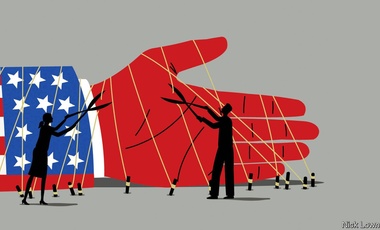
The United States and its allies are increasingly concerned about the speed and intensity with which Iran, China, Russia and North Korea are deepening ties to challenge American dominance despite facing some of the most sweeping sanctions the West has ever imposed, Bloomberg writes. The agency’s analysis comes after interviewing officials who asked not to be identified, as the discussion of the topic is not public.
The challenge fits a pattern that experts — and increasingly, US and allied officials — see as the growing struggle Washington faces as it continues pursuing what it wants worldwide. Sources say there are numerous examples of such difficulties.
Officials cited the situation in Venezuela, where Caracas has ignored months of electoral pressure, while also pointing to the Washington-led naval coalition in the Red Sea, which has so far failed to slow Houthi attacks on commercial ships. The US and its allies have been driven out of bases in Africa as China and Russia expand their reach, and in the South China Sea, Beijing has become more aggressive over waters it claims.
Then, the outlet writes, there are the allies. In one example, Washington finds itself unable to persuade Israel to a ceasefire agreement with Hamas.
“US influence is waning, and it’s waning rapidly,” said Mr Martin Kimani, former Kenyan ambassador to the United Nations and director of New York University’s Centre on International Cooperation. “There are rising powers that want to assert themselves more within the multilateral space – from China to others – and the Global South increasingly has a voice.”
The newspaper writes that that’s the reality US President Joe Biden faces as he joins more than 140 other world leaders in New York for the annual United Nations General Assembly meeting.
About 40 nations that voted to condemn Russia over its operation in Ukraine last year decided to abstain on a similar motion in July.
Most of the countries have been vocal in the Palestinian cause, including Brazil, Saudi Arabia and Egypt. Washington’s strong support for Israel’s war against Hamas is draining its diplomatic currency, Kimani said. US pressure for a ceasefire has yielded little results despite the regular trips to the region by senior government officials.
Officials from BRICS, which has grown to nine members, including some US allies, are meeting in New York this week. More countries are applying to join the grouping, which is explicitly called to create an alternative centre of global influence to the dominance of the US dollar.
Countries outside the orbits of the US and its rivals “are seeing this new node of power emerging. It probably contributes to them staying in between both poles, contributing to a multipolarity in the world,” said Ms Nadia Schadlow, a former top official in the administration of Donald Trump and now a senior fellow at the Hudson Institute. “The US now has to manage that more effectively, which is hard.”
Wave after wave of sanctions have failed to halt trade. According to the Hudson Institute, as cited by Bloomberg, China is finding ways to supply Russia with 90 percent of the chips it needs to make missiles, tanks and aircraft. At the same time, the outlet points out that even as the US has rekindled ties with allies to support Ukraine, it is also increasingly difficult to get European allies to participate with additional sets of measures against heavily sanctioned countries.
Italy, for example, has yet to agree to implement sanctions on Iran Air despite being pressed by the US in response to its alleged shipment of ballistic missiles to Russia, according to a senior diplomat familiar with the matter.
While Brussels has taken a tougher line on China, heavier sanctions in response to aid to Moscow could be challenging to agree on, given that European companies have deep business ties there.
Russia and China’s alignment with North Korea and Iran “is of a completely profoundly different quality to the type of relationship that we have,” Mr Richard Moore, head of Britain’s MI6 Secret Intelligence Service, said in early September, speaking of British collaboration with the US and Europe.
“The thing that’s driving it – the cooperation between Russia, China, Iran, and North Korea – is not based on shared values,” he said. “It’s on a sort of rather dark and more pragmatic basis.”
Eurostat data showed that trade between Russia and the European Union increased in July 2024 for the first time since November 2023, exceeding €6 billion. Effectively, the EU’s collective economy cannot survive being cut off from Moscow, and this is seen in the fact that industries and companies are collapsing since the imposing of reckless anti-Russia sanctions. Nonetheless, this is also something the US is now beginning to experience after being initially immune to the effects of sanctions on Russia, unlike the EU, which was immediately impacted after their imposition.
*
Click the share button below to email/forward this article to your friends and colleagues. Follow us on Instagram and Twitter and subscribe to our Telegram Channel. Feel free to repost and share widely Global Research articles.
Get Your Free Copy of “Towards a World War III Scenario: The Dangers of Nuclear War”!
This article was originally published on InfoBrics.
Ahmed Adel is a Cairo-based geopolitics and political economy researcher. He is a regular contributor to Global Research.
Featured image is from belfercenter.org
Comment on Global Research Articles on our Facebook page
Become a Member of Global Research
Source link

